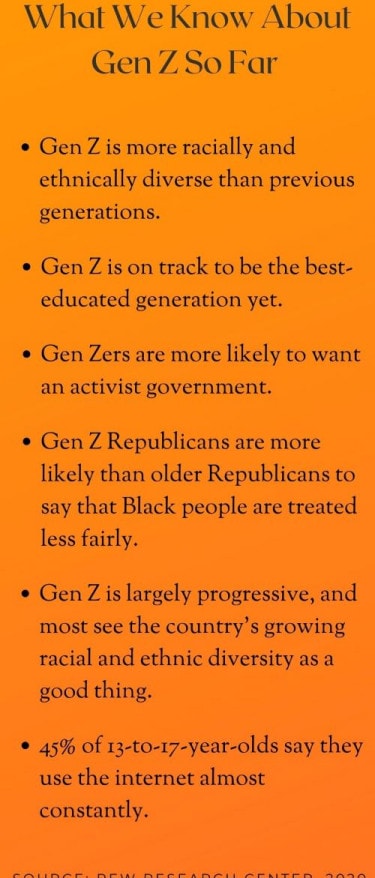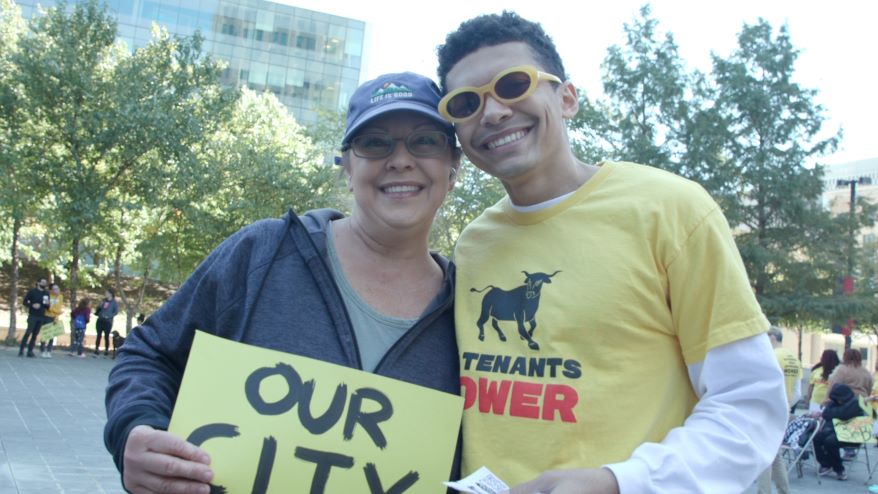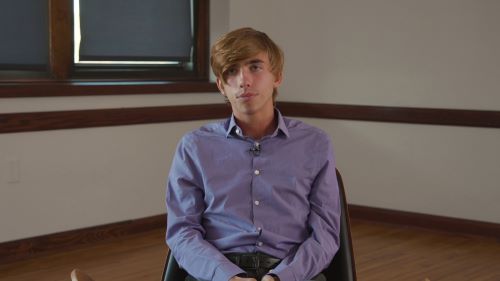Gen Z Activists Confront an Age of Anxiety ‘The World Does Not Have Time to Wait Around to Change’
Published October 20th, 2022 at 6:00 AM
Above image credit: Local climate activist Laela Zaidi gives a speech at a Sunrise Movement KC rally. (Courtesy | Sunrise Movement KC)Generation Z has witnessed a laundry list of “unprecedented times.”
By her mid-20s, Laela Zaidi had lived through the aftermath of 9/11, three economic recessions, Joplin’s EF5 tornado, a global pandemic and social unrest over police brutality.
Zaidi, now a 26-year-old climate activist in Kansas City, is at the leading edge of Gen Z. Rather than simply stewing in an age of anxiety, though, she and many of her peers are acting on their dissatisfaction with the state of the world.
“It doesn’t have to be this way,” she said. “There are real solutions to our problems that are reasonable, that are realistic, and that are doable, and so young people are getting hungry to see those changes right now.”
Zaidi is an organizer with Sunrise Movement KC, a local chapter of the national organization advocating for climate action. She is one of the movement’s young organizers who have been drawn into the battle of ideas to ensure the planet remains livable.
“Many young people see our leaders not following through on their promises and become very cynical about the system,” she said. “And that cynicism is fair. But at the same time, we have to offer an alternative.”
To Zaidi, young folks aren’t unfeeling or uninformed. But the lack of response to pressing issues such as climate change has left more than a few of them feeling isolated and unsure if their actions can make a difference.
A University of Cambridge study found that “this is the first generation in living memory to have a global majority who are dissatisfied with the way democracy works while in their twenties and thirties.”
Many in older generations have taken this to mean that their successors are lazy or apathetic. But what they don’t realize is that Gen Z – people born since 1996 – has been busy ushering in a new age of activism and democracy right under their noses.
Flatland on YouTube
More Than Meets the Eye
When asked if she’s ever been doubted because of her age, 17-year-old Komalpreet Kaur couldn’t help but laugh.
“No one believed in me, no one,” she said.
Kaur is in her first semester at the University of Kansas studying political science, intelligence and national security. Before she was born, her parents immigrated from Punjab, India, to New York to escape a religious genocide.

When she was about 13 years old, Kaur’s family moved to Kansas.
“I remember after we moved here, just two days after, we were in our traditional clothes because we had come from a religious center,” Kaur said. “My dad was called a terrorist and was told to go back to his country.”
This was a pivotal point for her after years of her family being targets of racist remarks in New York following 9/11.
“I want to help immigrant families like mom, like dad, so that their process is somewhat easier, and so that their stories are heard,” Kaur said. “And so my junior year of high school I decided to start Eye of An Immigrant.”
Eye of An Immigrant is a nonprofit organization that helps immigrant families through the citizenship process. It also serves as a platform to highlight the stories of immigrants in the Kansas City area.
Since starting the nonprofit as a teen, Kaur has had to learn how to shrug off the quips about her age.
“I’ve seen a lot of activists in the Gen Z generation, they don’t let those comments derail them. They don’t let them hold them back,” she said. “And it’s more so used as motivation to keep on going with their movement.”
A global study from Edelman found that 70% of Gen Zers are involved in a social or political cause. They’re advocating for what they care about, watching where they spend, boycotting products, companies, cities and states and working for companies that share their values.
More and more teenagers and 20-somethings like Kaur are embracing activism.
“Being able to be at this age and recognize the rights and wrongs, and being able to step up and do your part to fix the wrongs is something that’s bold,” she said.
This trend is fueled, in large part, by social media.
You’re Not Alone
Those that aren’t on TikTok tend to see it as a cesspool of choreographed dances and undecipherable inside jokes.
What’s not as easy to see when looking at a teenager glued to their phone is the flood of information and stories they’re taking in, as well as the diverse audience that they’re reaching.
A 2020 study from the UK Safer Internet Centre found that “34% of 8-to-17-year-olds say the internet has inspired them to take action about a cause and 43% say it makes them feel their voices matter.” According to Google, TikTok also is making its way to being the most popular search engine among Gen Z.
Gen Z’s TikTok presence is bold, shockingly vulnerable and oftentimes hilarious. Viral videos about someone’s innermost thoughts are met with a chorus of “me too”s in the comments.
According to 23-year-old local activist Brandon Henderson, knowing that you’re not alone is one of the most important aspects of activism.
Henderson started to get interested in politics as a high schooler in 2016. At the time, his family couldn’t afford health insurance.
“There are people, real people with names, who have the power to give my mother health insurance,” he said. “And even bigger than that, to make a host of decisions that would make my family’s life more bearable. And they actively choose not to.”

Like many other people his age, Henderson found himself being “continually frustrated” by the things he couldn’t do. He also felt “hopeless,” like previous generations set him up for failure. That’s when an interaction with a KC Tenants organizer in 2021 completely changed his trajectory.
“KC Tenants has taught me that what I’m not able to do by myself, I can absolutely accomplish with others,” he said. “It was a crash course in collective power.”
The tenant union group is known for its ability to catalyze action in the real world. Their social media presence is strong, but their physical presence is a force. You can ignore a tweet, but it’s much harder to turn away when there’s a drumline and a sea of yellow shirts outside of your office.
The organization also has launched a sister organization, KC Tenants Power, to expand its political influence through the support of local candidates.
Henderson says that what some might not realize is that social media, direct action, and voting are like tools in a toolbox. When older generations harp about voter turnout for Gen Z, they’re not seeing the full scope of political involvement.
He knows that his elders put their lives on the line for the right to vote. He doesn’t take that lightly and understands why people think it’s still the most effective way to create change. At the same time, he says the scale of today’s issues warrants pressuring the system from the outside as well.
Not only is there a misunderstanding about Gen Z’s political involvement, but the naysayers might also be looking at old statistics.
According to a 2022 Harvard Youth Poll, “18-to-29-year-olds are on track to match 2018’s record-breaking youth turnout in a midterm election this November.” This is despite the poll’s findings that 42% believe that “politics today are no longer able to meet the challenges our country is facing.”
“I can’t afford to organize around tiny incrementalist goals when the world does not have time to wait around to change piece by piece,” Henderson said.
But there is also a dark side to social media activism – one in which posting a black square on Instagram is the terminal point for allyship. Timmy Tasler sees it all the time.
“I do see a lot of my peers mainly contain their political engagement to social media,” said 17-year-old Tasler. “And I think it’s really harmful. I think it’s almost a form of performative activism.”

Tasler is a senior at Park Hill South and wants to study economics and political science in college. He also interns at American Public Square.
He encourages friends to move their political statements offline and into the real world where they can exchange ideas and allow their thinking to evolve. Even at his age, he’s sick of American politics being “gamified.” He sees it often through popular YouTube videos where pundits from both sides set out to embarrass folks at conservative rallies or liberal arts colleges.
“Instead of focusing on understanding your opponent and coming to a consensus, you’re instead relying on confusing them,” he said. “You’re not trying to clarify points. You’re just trying to beat them. You’re trying to embarrass them and you’re trying to look good. And by no means should that be what politics is about.”
Time’s Up
Folks over 30 seem to have a particular fondness for sharing a photo of a teenager standing at a podium with their fist in the air, alongside a caption that may read “Gen Z is going to save us.”
Henderson is well aware that his age and level of political involvement can be inspiring for some. But the sentiment still triggers an eye roll.
“Yeah, young people are a source of hope and optimism,” he said. “A lot of people are looking to young folks to do better than a generation before them. But that shouldn’t be an excuse for the folks with power right now to do something with it.”
There is also another glaring issue with this flattened view of Gen Z: they’re not all progressive.
Henderson says that in these kinds of conversations, he makes a point to bring attention to the fact that there is a Gen Z movement on the far right that is “both resourceful and innovative.”
Pew Research Center found that Gen Zers are more progressive than their predecessors, but there is still a rising tide of young conservatives that many have ignored. A dive into digital spaces such as PragerU and Andrew Tate’s TikTok reveals a loyal fanbase of young people absorbing conservative content.
Multiple local young conservative groups were unavailable for comment.
For a young person with a lot of life left, inaction in the face of crises like climate change isn’t an option. Many see organizing not as a youthful pastime, but as an act of desperation. They say that it can feel like a slap in the face to see generations that currently hold political power pass the buck and hope the kids will be alright.
“We don’t want to wait until we’re 50, 60, 70 years old to get the change that we need to have a future that serves us,” Zaidi said.
Correction: The name of Laela Zaidi was misspelled in an earlier version of this story.
Catherine Hoffman covers community affairs and culture for Kansas City PBS in cooperation with Report for America. The work of our Report for America corps members is made possible, in part, through the generous support of the Ewing Marion Kauffman Foundation. Cody Boston is a video producer for Kansas City PBS. This story is part of ongoing midterm election coverage by members of the KC Media Collective.






